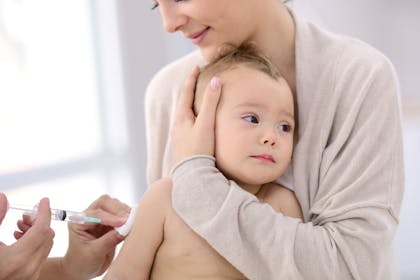Find out what vaccinations your baby or child will be offered, and when. Plus, get info about the diseases vaccines protect against and why they're so important for your little one, with tips on what to expect on the day.
What baby vaccines are available on the NHS in 2023?
To help you keep track of your baby's immunisation schedule, here's what they should be having and when:
Age: 8 weeks (2 months)
- 6-in-1 vaccine – this single jab contains vaccines to protect against six separate diseases: diphtheria, polio, tetanus, whooping cough (pertussis), Haemophilus influenzae type b (Hib) and hepatitis B
- Rotavirus vaccine - this oral vaccine protects against rotavirus
- Men B vaccine - this injection protects against meningitis B
Age: 12 weeks (3 months)
FREE NEWBORN NAPPIES
- 6-in-1 vaccine (second dose)
- Rotavirus vaccine (second dose)
- Pneumococcal (PCV) vaccine - this injection protects against pneumococcal infections, which can lead to pneumonia
Age: 16 weeks (4 months)
- 6-in-1 vaccine (third dose)
- Men B vaccine (second dose)
Age: 12 months (one year)
- Hib/Men C vaccine - this single jab protects against meningitis C (first dose) and Hib (fourth dose)
- MMR - this single jab protects against measles, mumps and rubella
- Pneumococcal (PCV) vaccine (second dose)
- Men B vaccine (third dose).
Age: Every year from 2-10 years
- Children's flu vaccine (nasal spray) – given annually between the months of September and January.
Age: Three years and four months
- MMR (second dose)
- 4-in-1 pre-school booster - a booster jab to further protect against diphtheria, tetanus, whooping cough and polio
Age: 12 to 13 years
- HPV vaccine, which protects against the types of human papillomavirus that cause the most cervical cancer – two injections given 6-24 months apart.
Age: 14 years
- 3-in-1 teenage booster - a booster jab to further protect against diphtheria, tetanus and polio.
- Men ACWY vaccine - this single jab protects against meningitis A, C, W and Y
New university students aged 19-25 are also advised to get the Men ACWY – if they've not yet had it – by contacting their GP.
Will I get a reminder about my baby's vaccinations?
You should automatically receive letters from your NHS Trust a few weeks before each vaccination appointment is due. It should list which vaccinations are due and when. You'll have to call up your GP practice to make the appointment.
You may find it helpful to set a reminder on your phone for when each set of immunisations is due, though. That way, you can be confident that your baby won't miss any of their vaccinations, in case you don't get a reminder from the NHS for any reason.
What diseases does vaccination protect against?
These are the diseases that your child can be vaccinated against on the NHS, and why getting your baby immunised is so important:
Diphtheria: a highly contagious infection that affects the nose and throat. It can cause difficulty with swallowing and breathing, and large blisters on the skin. If not treated very quickly, it can sadly be fatal.
Flu (influenza): much more serious than a cold, this viral illness can lead to complications such as pneumonia.
Hepatitis B: an infection of the liver that can last for years and lead to life-threatening liver damage. Chronic hepatitis can't be cured, and often requires lifelong treatment and monitoring for any problems.
Hib (Haemophilus influenzae type b): a bacterial infection that can cause potentially fatal infections like meningitis, sepsis and pneumonia.
HPV (human papillomavirus): a viral infection that can cause cervical cancer.
Measles: a highly infectious viral illness. While the most known symptom is the measles rash, it can lead to complications such as pneumonia and encephalitis (an infection of the brain), which can be life-threatening.
Meningitis: the MenB, Hib/MenC and Men ACWY vaccines each protect against a different type of meningococcal bacteria. Meningococcal infections can lead to meningitis and sepsis, which can both lead to brain damage, or sadly even be fatal.
Mumps: mumps is a viral infection which causes painful swelling at the sides of the face. In rare cases, it can lead to meningitis.
Pneumococcal infections: the childhood PCV vaccine protects against 13 different strains of pneumococcal bacteria, which can cause potentially serious infections such as meningitis and pneumonia. These infections can lead to brain damage, or sadly even be fatal.
Polio: a serious infection that can cause paralysis. In some people, the paralysis is permanent. It can also spread to the lungs, which is life-threatening. There is no cure for polio.
Rotavirus: a highly infectious stomach bug that causes diarrhoea and vomiting. In young children, this can often lead to severe dehydration, which can be very dangerous.
Rubella (German measles): a viral infection that causes a spotty rash. It's often fairly mild, but can be extremely dangerous for pregnant women.
Tetanus: a serious infection from a cut or wound, that usually requires a stay in a hospital intensive care unit.
Whooping cough (pertussis): a bacterial infection of the lungs. It's particularly serious in babies under six months (who can experience fits and breathing difficulties), but even in older kids, the cough can be enough to cause a hernia.
How can I keep track of my baby's immunisation schedule?
Your child's red book is the perfect place to record any vaccinations they've been given.
If you've lost your child's red book, or aren't sure if they're up-to-date on their vaccinations, ask your GP. They should have a record of what your child has had.
Are there any vaccinations my baby should have that aren't on the schedule?
The NHS immunisation schedule offers all the vaccinations that healthcare professionals have deemed safe and effective for your baby. Most experts agree that getting the free NHS vaccinations should be enough to protect your little one.
Some parents do decide to get other vaccinations done privately, most commonly, the chickenpox vaccine . However, the NHS advises against getting your child vaccinated for chickenpox. Here's why:
Chickenpox is generally a mild illness that goes away within a few days, and is very unlikely to do your child any harm. However, chickenpox can be much more serious for adults.
Healthcare professionals are worried that, if parents start vaccinating against chickenpox, then it won't spread through most children as it currently does. That would leave unvaccinated people at a higher risk of getting it as adults, when complications are more likely.
Overall, the risks are lowest if we just let kids get chickenpox while they're still young.
If you're considering private vaccinations, it's worth having a chat with an NHS GP to get their advice first. Private clinics may be more interested in encouraging you to spend money than on what's right for your child.
Need advice?
Our health visitors and nursery nurses are online Monday to Friday evenings to answer your queries on feeding, sleep and child health.
How many vaccines do children get?
All together, most children will have about 12 vaccinations in their first year. Some of these are oral vaccines, so that doesn't mean 12 injections.
By the time your child is 15, they'll probably have had about 27 vaccinations (including the yearly flu jab). This may sound like a lot, but remember it's spread out over many years!
All of the vaccinations have been rigorously tested for safety. The diseases they protect against are incredibly serious, so healthcare professionals always recommend that you get your baby vaccinated according to the schedule.
Do vaccinations have side effects?
Yes, some vaccinations can cause mild side effects, such as a fever or redness around the site of the injection. Your baby may be a bit out of sorts after certain vaccines, and need some extra cuddles and comfort.
Learn more about side effects and what else to expect from each set of your baby's vaccinations by clicking the links below:
Sources for more information
- Vaccinations and newborn screening tests (NHS)
- Your toddler's vaccination and immunisation schedule (NHS)
- The routine immunisation schedule chart (NHS)
Have more questions about vaccines? Check out our FAQ page below, or share experiences with other parents in our Forum:







